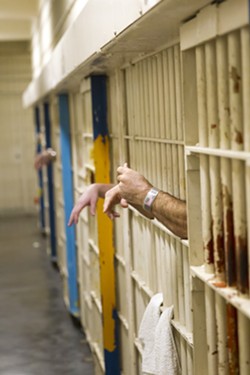SLO prepares for the end of California's cash bail system following the passage of SB 10
By Chris McGuinness[{
"name": "Ad - Medium Rectangle CC01 - 300x250",
"id": "AdMediumRectangleCC01300x250",
"class": "inlineCenter",
"insertPoint": "8",
"component": "2963441",
"requiredCountToDisplay": "12"
},{
"name": "Ad - Medium Rectangle LC01 - 300x250",
"id": "AdMediumRectangleCC01300x250",
"class": "inlineCenter",
"insertPoint": "18",
"component": "2963441",
"requiredCountToDisplay": "22"
},{
"name": "Ad - Medium Rectangle LC09 - 300x250",
"id": "AdMediumRectangleLC09300x250",
"class": "inlineCenter",
"insertPoint": "28",
"component": "3252660",
"requiredCountToDisplay": "32"
}]
On Aug. 28, California Gov. Jerry Brown signed Senate Bill 10, a new law that will effectively end the use of cash bail in the state's criminal justice system.
Introduced to the state's Legislature nearly three years ago, the bill was touted by criminal justice reform advocates as a way to make the system more just and equitable.
When SB 10 goes into effect on Oct. 1, 2019, California's cash bail system will be replaced with a risk assessment-based system to determine if an arrested individual should be released pending trial or kept in jail. That system will take into account a defendant's risk to public safety, as well as their risk of not showing up to court. Under the new law, each county's court system will have to develop those assessment tools, and a local agency will actually carry out those pre-trial assessments. Locally, that task will fall to the SLO County Probation Department.
"It will be a new responsibility for our department," SLO County Chief Probation Officer Jim Salio said.
Salio, who also serves as president of the Chief Probation Officers of California, expressed confidence that his department would be able to handle its duties under the new bail system.
"Assessment and supervision is what probation does," he said. "We are very used to doing that."
The end of the cash bail system will also bring new changes to the SLO County District Attorney's Office. Instead of asking the court to raise bail, or in the cases of very serious crimes, deny bail for defendants, prosecutors will have to file "preventive detention" motions, which can block a defendant's release from jail. SLO County District Attorney Dan Dow said the new law would mean his office would have to be more active in evaluating how dangerous defendants might be, assessing whether or not to ask the court to keep them in jail.
"Now we will be participating much earlier in the process so that we can look at their criminal history and determine if we think they will be a good candidate for release or not," Dow said.
Prior to the bill's passage, Dow expressed worries about the impact on public safety. While amendments to the bill have left him cautiously optimistic about its implementation, Dow said he still had some concerns.
"Until it works itself out, we don't know how well the risk assessment model will work," he said. "My No. 1 concern is protecting the victim."
Dow is far from the only elected official with reservations about the system. Assemblyman Jordan Cunningham (R-San Luis Obispo) has long been a vocal critic of SB 10. Prior to voting "no" on the bill, Cunningham voiced his concerns on the Assembly floor, characterizing the legislation as a radical change to the state's justice system, and warning that its passage would compromise public safety.
"There are going to be people who fail to appear that are blessed to remain at large in public by a bureaucracy that will go out and do terrible things," Cunningham said.
Oddly enough, some of the loudest voices against the bill's passage were individuals and groups who initially supported it. Those include the California ACLU, The California NAACP, and Bend the Arc, a progressive Jewish organization that advocates for social justice issues. The groups turned against the bill after they said several amendments undermined its original intention.
"It actually expands the tools of detention so that more people could be locked up before trial for longer periods of time," said Barry Price, a member of Bend the Arc's SLO chapter. "Certainly, ending the abhorrent cash bail system is a positive thing, but replacing it with something even worse is not positive."
Cunningham's challenger in the November election, Bill Ostrander, was also initially in favor of the bill. After its amendments and passage however, Ostrander opposed it, stating that the bill he once supported was "not the bill that was passed."
Price said that many groups would push for new legislation, and that the new law might also face challenges in court.
"We understand that this is a long-term effort," he said. "We are going to continue the fight."
The state's bail industry is also not taking the passage of SB 10 lying down. In a written statement made shortly after the bill was signed into law, a coalition of the state's bail industry associations warned that the law would put thousands of Californians out of work, and it announced a drive to place a referendum to overturn the law on the ballot in 2020. Δ
Staff Writer Chris McGuinness can be reached at [email protected].
Latest in News
Comments
Showing 1-1 of 1
Readers also liked…
-

Coast Unified teachers upset over new position's salary and qualifications
Oct 20, 2022 -

SLO police identify alleged driver who hit and killed couple
Dec 22, 2022 -

When the levee breaks: Oceano residents, county officials walk a tightrope of regulations to manage Arroyo Grande Creek, which some say led to the levee's failure in January
May 18, 2023









